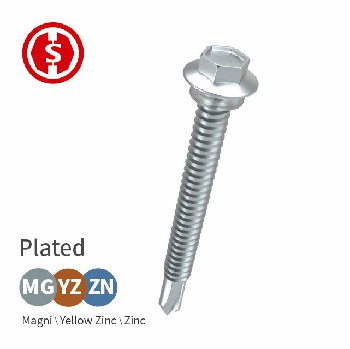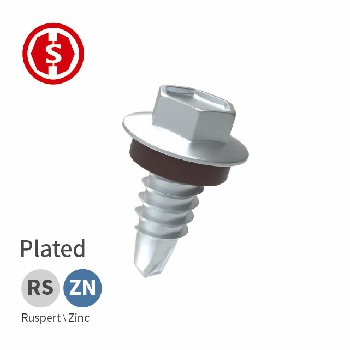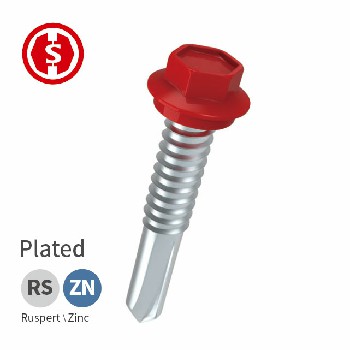

Self-tapping screws, as the name suggests, are fasteners designed with a unique ability to create their own threads when driven into a material. Unlike traditional screws that require pre-drilled pilot holes, self-tapping screws have a sharp, pointed tip that enables them to cut into the material and form threads during installation. This feature makes them particularly popular for quick and efficient assembly processes.
The working principle of self-tapping screws is quite simple yet effective. As the screw is rotated into the material, its sharp point initiates the process of creating a helical path by displacing the material around it. This results in the formation of threads, allowing the screw to tightly grip the material and hold it securely in place.

Thread-Forming Self-Tapping Screws
Thread-forming self-tapping screws work by molding the material rather than cutting it. These screws are often used with plastic and thin sheet metal. The threads they create are strong and provide excellent resistance against loosening.
Thread-Cutting Self-Tapping Screws
Thread-cutting self-tapping screws have sharp cutting edges that remove the material as they are driven in. They are ideal for use with metals and hard materials, providing a precise and secure thread fit.
Thread-Rolling Self-Tapping Screws
Thread-rolling self-tapping screws displace the material and shape it into threads without cutting or removing any material. These screws are commonly used in softer materials like aluminum and offer high resistance to vibrations.

Eliminating the Need for Pre-Drilling
One of the significant advantages of self-tapping screws is that they eliminate the need for pre-drilling pilot holes. This not only saves time during installation but also reduces the risk of damaging the material, especially in delicate applications.
Increased Fastening Efficiency
With self-tapping screws, the fastening process becomes more efficient and streamlined. As they create their own threads, they require fewer steps and tools, making them an ideal choice for high-volume assembly lines.
Suitable for Various Materials
Self-tapping screws are versatile and can be used with various materials, including wood, metal, plastic, and composite materials. This adaptability makes them a go-to fastening solution for a wide range of applications.
Consider Material and Thickness
When selecting a self-tapping screw, it is essential to consider the type and thickness of the material you are working with. Different materials may require specific screw types and sizes to ensure a secure and long-lasting connection.
Selecting the Correct Size and Length
Choosing the correct screw size and length is crucial for achieving the desired results. Using a screw that is too short may not provide enough grip, while using one that is too long can damage the material.

Preparing the Work Surface
Before installing self-tapping screws, it is vital to ensure that the work surface is clean and free from debris. This allows for better penetration and minimizes the risk of irregular threads.
Using the Right Tools
Using the appropriate tools, such as a power drill or screwdriver, is essential for smooth and effective installation. It helps prevent stripping or damaging the screw head and ensures a secure fit.
Correct Insertion Angle and Pressure
Maintaining the right insertion angle and applying appropriate pressure is crucial to prevent the screw from veering off track and to achieve a snug fit without over-tightening.
Construction and Woodworking
In the construction and woodworking industries, self-tapping screws find extensive use in assembling furniture, cabinetry, and framing structures. Their ability to grip wood securely makes them an invaluable choice for such applications.
Automotive Industry
The automotive industry relies on self-tapping screws for various components and accessories. From interior paneling to securing electrical components, these screws provide a reliable and durable fastening solution.
Electronics and Appliances
In the electronics and appliance sectors, self-tapping screws play a crucial role in assembling circuit boards, casings, and other components. Their precision and stability ensure that delicate electronics are held securely in place.
Avoid Over-Tightening
Over-tightening self-tapping screws can lead to stripped threads and compromised connections. Following the manufacturer's torque recommendations is essential for maintaining the structural integrity of the assembly.
Protect Against Corrosion
For outdoor or humid environments, using self-tapping screws made from corrosion-resistant materials is crucial to prevent rust and maintain the longevity of the fastening.
Regular Maintenance
Periodically inspecting and tightening self-tapping screws ensures that connections remain secure over time, preventing potential hazards or failures.
Shandong Shenghang Technology Co., Ltd. takes scientific and technological R &D as the guide and is committed to the R &D, production, sales and service of environmental protection and energy-saving products.
The Importance of Metal Roof Anchors for Fall Protection
2023-04-27residential roof anchor
2022-11-24What is the principle of hardening reaction of fire rated roof tile
2021-12-10Understanding the Importance of Permanent Roof Anchors for Safety and Compliance
2023-06-02
Tel: + 0086 15076176199 + 0086 311-87880324
No.3 Mingdu International Building,
Economic and Technological Development
Zone, Linyi
Shandong China
Shandong Shenghang TECHNOLOGY CO.,Ltd